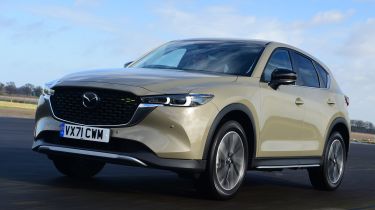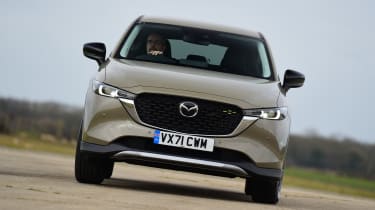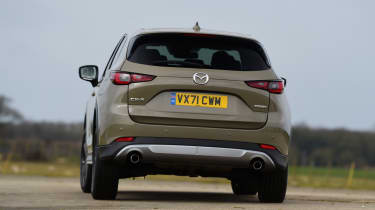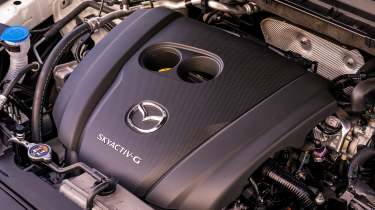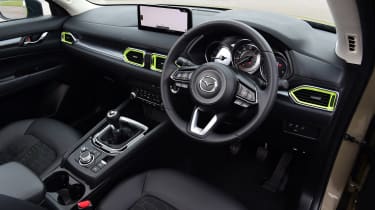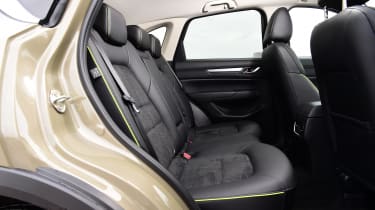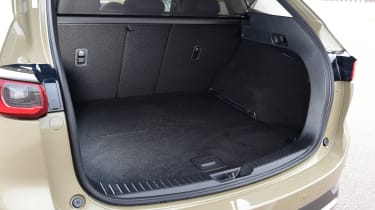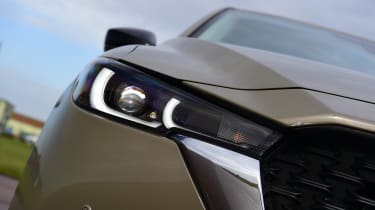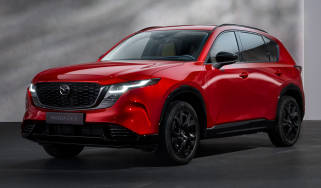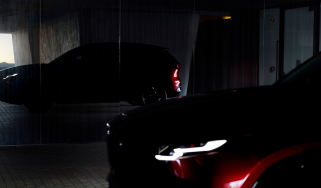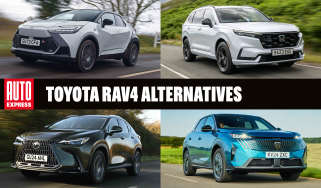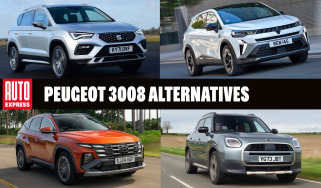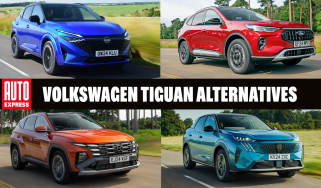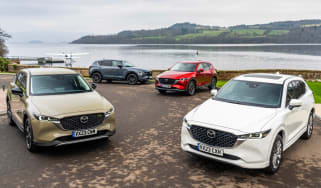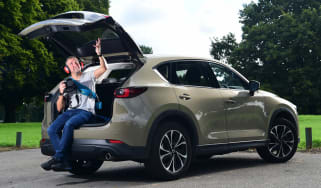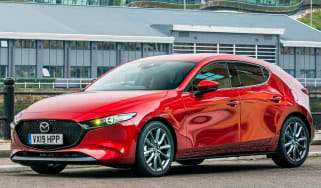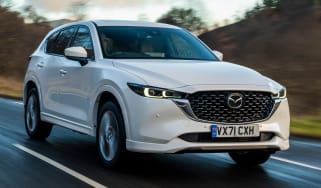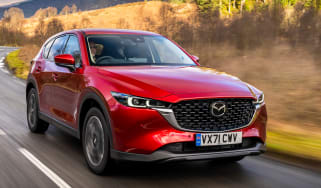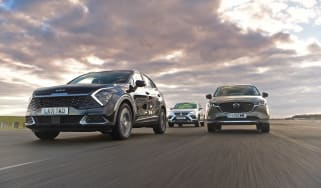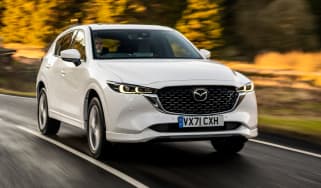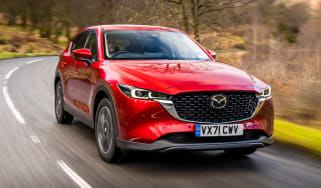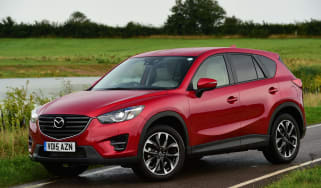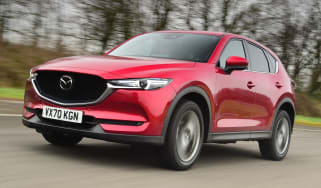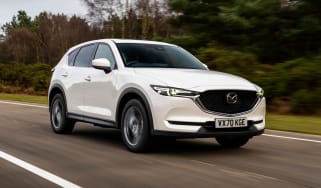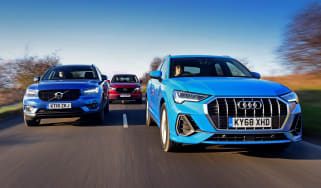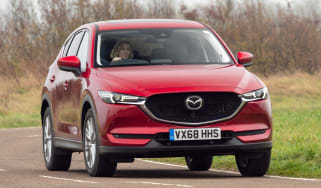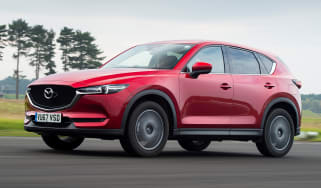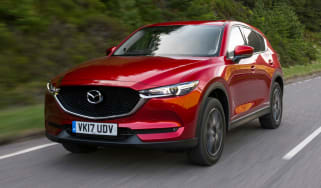Mazda CX-5 review
The Mazda CX-5 is good to drive, while decent levels of comfort, space and tech help it to challenge the leading mid-size SUVs

Our opinion on the Mazda CX-5
The latest Mazda CX-5 has retained (and improved on) its USP of being the SUV of choice for keen drivers. It handles better than ever, but most importantly, its comfort and refinement are at another level when compared to the previous model. This is very important, too, because this Japanese mid-size SUV needs every advantage in order to stay competitive against the best in this very tough market.
Combine these credentials with an upmarket interior and plenty of kit, and it's easy to see why this is one of Mazda's best-sellers. Granted, the design doesn't really move the game on, and some rivals beat it for tech and practicality, but as an all-round family SUV that's both comfortable and agile, it's an excellent package.
About the Mazda CX-5
The Mazda CX-5 is a mid-size SUV that's ideal for people who are used to driving a car that's fun to drive, rather than just being practical everyday transport. Sharp handling is one of this car’s biggest bragging points, but there's much more to the CX-5 than that.
As well as being fun to drive, the Mazda CX-5 offers good fuel economy from its wide range of responsive engines.
We’ve tested the CX-5 in a variety of real-world situations during its lifetime. Not only did we live with a diesel-powered CX-5 for six months as part of our long-term test fleet, but we also pitted Mazda’s SUV against key rivals in a group test, where it put on respectable performance, even if it stopped short of first place due to rivals like the Skoda Kodiaq offering greater practicality.
Mazda CX-5 prices and latest deals
There are five trim levels to choose from with the CX-5, so the price range is broad. Entry-level Centre-Line models start from £31,600, and moving up to the range-topping Takumi model will see this climb to at least £37,100.
Used - available now
If you spec your perfect Mazda CX-5 via the Auto Express Buy a Car service, you can enjoy an average saving of up to £2,300. We also have new Mazda CX-5s in stock, along with plenty of used Mazda CX-5 deals to choose from. We can also help you sell your car.
Performance & driving experience
Pros |
|
Cons |
|
Mazda says this second-generation CX-5 features a “fully revised body structure” that uses the firm’s SkyActiv underpinnings. Changes include a 15 per cent improvement in the body’s torsional rigidity, which has enabled engineers to tweak the suspension to offer more comfort, apparently without compromising the CX-5’s trademark engaging dynamics.
As part of its mid-life facelift, the CX-5 received updated damping to help make it feel more composed than some rivals, with only a little more body-roll as a trade-off. However, the difference is still marginal at normal speeds, and although this makes it an enjoyable car to drive, around town and on a cruise, there’s not much in it.
Other advances include Mazda's G-Vectoring Control, which adjusts engine torque on the way into corners to improve turn-in response, and a newly designed pin that secures the piston to the connecting rod in the engine, helping dampen vibration and boost refinement. This dynamic damper cuts engine noise noticeably. The CX-5 is quiet at idle and more hushed on the move, with the extra torque combining with this refinement to deliver a relaxing drive. The petrol feels much more composed in the bends than the nose-heavy diesel model as well.
| Model | Power | 0-62mph | Top speed |
|
CX-5 2.0 e-Skyactiv G Centre-Line
| 165bhp | 10.7 seconds | 125mph |
|
CX-5 2.5 e-Skyactiv G Takumi
| 194bhp | 9.5 seconds | 121mph |
| CX-5 2.2d Exclusive-Line | 184bhp | 9.2 seconds | 129mph |
Performance, 0-60mph acceleration and top speed
The CX-5’s two four-cylinder engines are both carried over from the previous CX-5, with several revisions to improve refinement and response.
The 2.0-litre petrol engine is naturally aspirated, unlike most of its turbocharged rivals. The CX-5 doesn’t feel as strained as you might expect, with a respectable 213Nm of torque and 163bhp, it manages the 0-62mph sprint in 10.7 seconds.
Despite its extra 28bhp and 50Nm of torque, the 2.5-litre petrol version only manages a 9.5 second time from 0-62mph, which is almost two seconds off a comparable Skoda Karoq 2.0-litre TSI. We found this version of the CX-5 to be a little unrefined, too, particularly when pressing on. It definitely suits a more relaxed driving style where the powertrain isn't overly stressed.
The 2.2-litre diesel is a strong and flexible unit, with gutsy torque delivery and a broad spread of power. This engine manages a 0-62mph time of 9.2 seconds in manual form, and 9.3 with the automatic.
Town driving, visibility and parking
The Mazda CX-5 is pretty manoeuvrable around urban streets. All CX-5s come with all-round sensors fitted, which help to prevent parking mishaps. For additional peace of mind, Exclusive-Line cars and above come with a reversing camera, too.
Country road driving and handling
Pretty much all Mazdas offer an agile and fun driving experience relative to their competitors, and the CX-5 is no different. For a tall and fairly heavy SUV, its direct steering, strong grip levels and impressive agility make cars like the Volkswagen Tiguan look like lumbering beasts. You can tell from the way the CX-5 drives that it was developed by the same company that builds the MX-5 sports car.
The CX-5’s steering is very communicative. It’s heavier than you'll find in a Skoda Kodiaq or Volkswagen Tiguan, but it gently ripples with information. Not to the point where it becomes taxing, but just enough to offer you a good connection with the front tyres.
It’s this that gives the Mazda its dynamic edge. The CX-5 certainly turns in sweetly, with plenty of grip to lean on, while the suspension takes up a nice amount of roll but controls body movement well.
Motorway driving and long-distance comfort
If you want to get a shift on when hitting the motorway, the power delivery across the Mazda’s engine range is decent, but compared to turbocharged offerings from the VW Group, you’ll have to work the petrol engines of the CX-5 a bit harder.
On the bright side, this does mean you get to utilise the excellent manual gearbox more often – we’d recommend choosing the manual because the six-speed automatic is a little slow to shift and can hold on to gears for too long. The DSG automatic used in the Skoda Kodiaq and VW Tiguan is much better.
"The car’s automatic gearbox is a peach, with a pleasingly smooth shift. Plus the ride is acceptable on British roads, the steering is responsive and body roll is kept neatly in check. It’s another reminder that Mazda’s engineers really do know how to make a great-driving car beyond the MX-5 roadster."- Pete Gibson, senior photographer.
MPG & running costs
Pros |
|
Cons |
|
In the pursuit of cleaner emissions, Mazda has also added 24V mild-hybrid technology and cylinder deactivation across the range. The system shuts down two of the engine's four cylinders under light load, contributing to a 9g/km reduction in CO2.
The 2.0 e-SkyActiv G petrol is able to return up to 43.5mpg on the WLTP combined cycle when fitted with the manual gearbox, and 40.9mpg for the six-speed auto-equipped version, although higher spec cars on bigger wheels and with more kit will deliver poorer figures. The 2.5-litre car delivers up to 37.2mpg on the combined cycle.
The SkyActiv-D diesel also delivers different figures depending on the car's spec. The manual manages a best combined figure of 50.4mpg, while adding the auto box sees this reduced to 46.3mpg.
Emissions for the CX-5 range from 146 to 173g/km for petrol cars, while diesels range from 147 to 173g/km. Rivals such as the Peugeot 3008, Skoda Karoq and hybrid-equipped Honda CR-V and Toyota RAV4 are less polluting.
| Model | MPG | CO2 | Insurance group |
| CX-5 2.0 e-Skyactiv G Centre-Line | 43.5mpg | 146g/km | 17 |
| CX-5 2.5 e-Skyactiv G Takumi | 37.2mpg | 171g/km | 21 |
| CX-5 2.2d Exclusive-Line | 50.4mpg | 147g/km | 26 |
Insurance groups
The CX-5 is reasonably competitive in terms of insurance costs. The petrol is the cheapest, starting at group 17, which puts it on par with the equivalent Skoda Karoq. The CX-5 diesels slot into groups 26 to 27, depending on which variant you choose. Elsewhere, one of the nation’s best-selling mid-size SUVs, the Nissan Qashqai, sits in groups 12 to 24.
Check if your car needs an MoT and view its complete history with our MoT History Checker...
Tax
There are no major Benefit-in-Kind (BiK) tax breaks for company car drivers to be had with the Mazda CX-5, unlike its plug-in hybrid or all-electric rivals. The majority of the range qualify for the standard rate of VED road tax, although higher-spec cars can also creep above the £40,000 luxury car tax threshold, which will incur a £620 levy between years two to six after it’s first registered.
Depreciation
The Mazda CX-5 is a reasonable performer in the depreciation leagues, as our expert data predicts that it’ll retain 45 to 51 per cent of its initial value after 36,000 miles or three years. The Skoda Karoq, meanwhile, holds on to 44 to 48 per cent after the same period, while the Nissan Qashqai manages 45 to 49 per cent.
To get an accurate valuation on a specific model check out our free car valuation tool…
Interior, design & technology
Pros |
|
Cons |
|
The CX-5's front end is more muscular than the rounded face of the car it replaced, and the surfacing is very smart. Styling is ultimately subjective, but in our view it’s one of the more attractive designs in the class, giving the SEAT Ateca a run for its money in the desirability stakes. There are clear elements of Mazda’s overarching Kuro influence here, with the CX-5 sharing design traits with the MX-5.
Interior and dashboard design
The design changes from the facelift were even less radical inside, and the layout and switchgear will be instantly recognisable to owners of the first-generation CX-5. However, changes to the controls ensure it is easier to operate things on the move, and there’s a real sense that Mazda wants the driver to be focused on the job of actually driving the car.
Materials and build quality
The CX-5 uses a largely first-rate blend of materials, and fit-and-finish is excellent. The old car was already pretty good in this regard, but now the Mazda is on a par with VW for interior polish.
Infotainment, sat-nav and stereo
Infotainment used to be a weak link with Mazdas, but in recent years the brand has upped its game, particularly with the introduction of the larger 10.25-inch infotainment screen you find in the CX-5. Apple CarPlay and Android Auto are available, along with DAB and Bluetooth.
If you’re not a fan of touchscreen-only infotainment systems, the CX-5’s rotary controller will be a breath of fresh air. The controller is easy to operate on the move, although the menu layout isn’t especially logical and too many inputs are required to perform some tasks.
Entry-level cars come with a six-speaker sound system that provides perfectly adequate quality. However, Exclusive-Line trim and above offers a Bose ten-speaker audio system with a subwoofer and separate tweeters, which sounded far punchier and crisper during testing.
“This is not the first Mazda to have graced the Gibson driveway for a longer stint – I’ve had the 6 and the current 3 – so even accounting for the evolution inside, there’s a pleasingly familiar feel to the CX-5’s cabin. I have noticed improvements in perceived quality, though.” - Pete Gibson, senior photographer.
Boot space & practicality
Pros |
|
Cons |
|
Mazda hasn’t seen fit to follow most manufacturers by making the CX-5 bigger than its predecessor in every direction. The boot is the same size as in the previous car, and passenger space isn’t much bigger. However, the CX-5 was already competitive in this area, so it’s not too much of an issue.
Subtle changes help improve comfort, with the gear lever raised by 40mm to bring it closer to the steering wheel and repositioned armrests for better body alignment. Visibility is pretty good, despite a driving position that’s a bit more low-slung than rivals.
The rear seat backs have been moved slightly for better posture and recline in two steps, while there are now air-con vents for those in the back there, too. Extra cabin storage features ensure it’s a truly usable family holdall.
Dimensions and size
The CX-5 is just over 4.500mm long and 1,800mm wide, and is pretty much identical to the outgoing car in these respects. It’s slightly lower than before, though, which is unusual for an SUV.
| Dimensions comparison | |||
| Model | Mazda CX-5 | Skoda Karoq | Nissan Qashqai |
| Length | 4,575mm | 4,398mm | 4,425mm |
| Width | 1,845mm | 1,841mm | 1,835mm |
| Height | 1,680mm | 1,612mm | 1,625mm |
| Wheelbase | 2,700mm | 2,640mm | 2,670mm |
| Boot space | 522 to 1,638 litres | 588 to 1,630 litres | 504 to 1,598 litres |
Seats & passenger space
Small changes make the latest CX-5 more comfortable for passengers, but the actual space on offer is unchanged from the previous model. Both the front and rear seats have similar amounts of legroom, and it’s plenty spacious enough for a growing family.
There’s a good amount of headroom for all but the tallest adults, and you’ll find more legroom inside the Mazda than you will in a Ford Kuga. Even the largest people will be well accommodated in the front of the Mazda.
It’s just a pity that no seven-seat variant is offered, or that the rear bench doesn’t slide to increase rear leg room.
Boot space
The CX-5 offers 522 litres of boot space with its rear seats up, and most families will find the Mazda's wide, flat load bay offers plenty of space. There’s also 30 litres of under-floor storage, while folding all of the seats down opens up a substantial 1,638 litres of space. If you need even more space, you’ll need to look towards the Skoda Karoq.
The rear seats split in a more flexible 40/20/40 configuration, which is useful when loading longer items into the boot and you still want to carry a passenger in the back.
Towing
Opting for the CX-5 in 2.0-litre petrol form with a manual gearbox means a maximum braked trailer weight of 1,800kg, while the automatic version and more powerful 2.5-litre model see this figure climb to 2,000kg. The diesel variants also provide a 2,000kg towing limit.
“The CX-5 isn’t the largest SUV that Mazda offers, but it’s still more than practical enough for most scenarios. My family has thrown plenty at it, from a load of new flooring to an old fridge, and it has sailed through these challenges with ease.” - Pete Gibson, senior photographer.
Reliability & safety
Pros |
|
Cons |
|
With an engine range carried over from the last car with only small revisions, as well as plenty of existing tech from the rest of the Mazda car range found throughout the cabin, there shouldn't be much that will go wrong with the current CX-5.
It looks like there’s work for Mazda to do in terms of its reputation with customers, though, because it only managed a 17th place finish out of 31 brands in the most recent Driver Power best manufacturer results.
On the safety front, Mazda made a number of key advances when the CX-5 first arrived. An increase in the use of ultra high-tensile steel and underbody structures enhances the car’s strength in an impact without adding significant weight, while Mazda has worked hard on improving the front-end design for pedestrian safety. As a result, Euro NCAP awarded the CX-5 a top five-star crash test score in 2017. However, this rating has since expired because the test criteria has progressively become tougher.
All models come with six airbags as standard. ISOFIX child seat points feature on the rearmost two seats, too, but it’s the active safety tech that’s come on most: Advanced Smart City Brake Support (standard on all models) is improved over the old car with a wider operating window and the ability to detect pedestrians.
| Euro NCAP safety ratings | |
| Euro NCAP safety rating | Five stars (2017) |
| Adult occupant protection | 95% |
| Child occupant protection | 80% |
| Vulnerable road user protection | 78% |
| Safety assist | 59% |
Buying and owning
- Best buy: Mazda CX-5 2.0 e-Skyactiv G Centre-Line
The Mazda CX-5 offers enough equipment in base Centre-Line form that we think it’s a great buy as is. If you want maximum efficiency, opt for the manual gearbox unless you simply have to have an automatic. If you’d rather have a touch of luxury with things such as half leatherette seats, you’ll need to fork out an extra £1,000 for the Newground trim.
Mazda CX-5 alternatives
The CX-5 has a long list of excellent rivals. Pretty much every mainstream brand has a car in the mid-size SUV class, and models like the Peugeot 3008, Skoda Karoq and SEAT Ateca are just a handful of the Mazda’s tough competitors.
Elsewhere, the Hyundai Tucson and Ford Kuga both offer a stern challenge to the CX-5, then there are dependable choices such as the Kia Sportage, with its long warranty cover designed to give added confidence. The Citroen C5 Aircross and Vauxhall Grandland are also in the mix. Many of these cars also come with the option of plug-in hybrid power, although diesel alternatives are becoming increasingly limited.
Mazda CX-5 history
Mazda CX-5 Mk2: 2017-date
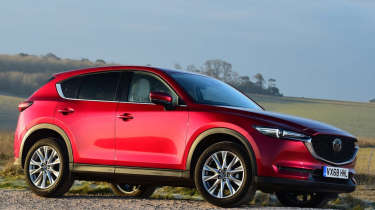
The CX-5 offers all the quality, practicality and kit you could want, so buying a used, or nearly new model could be the smart move. In fact, it does everything pretty well, although we'd avoid the 2.5-litre petrol model; it's expensive and lacks refinement. Safety has always been a strong point, with the CX-5 benefiting from lots of advanced tech and recognised with a top five-star Euro NCAP score. Read our full Mk2 Mazda CX-5 buyer’s guide here…
Mazda CX-5 Mk1: 2012-2017
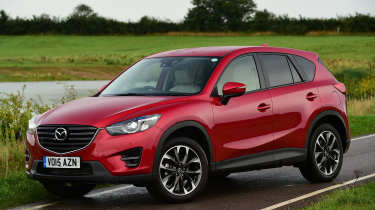
If you're buying a used family SUV, then ultimately you'll want it to be reliable. Opting for an early Mk1 Mazda CX-5 should prove to be a good bet, as not only does it continue Mazda's reputation for producing dependable cars, but it's spacious, comfortable and offers excellent levels of standard equipment. Thrown in the fact that it's also fun to drive, for a big family SUV, and it's easy to see why the talented CX-5 has been such a sales success. Read our full Mk1 Mazda CX-5 buyer’s guide here…
Frequently Asked Questions
All Mazdas come with a six-year/100,000 mile warranty. That’s a lot more generous than most rivals, including premium ones like Audi that only do three years/60,000 miles. It can’t quite match the Kia seven-year/100,000 mile warranty, though. There’s also a three-year warranty on paintwork, and twelve years' cover for rust. There are varying levels of extended cover available to buy, too.
Deals on the CX-5 and alternatives

